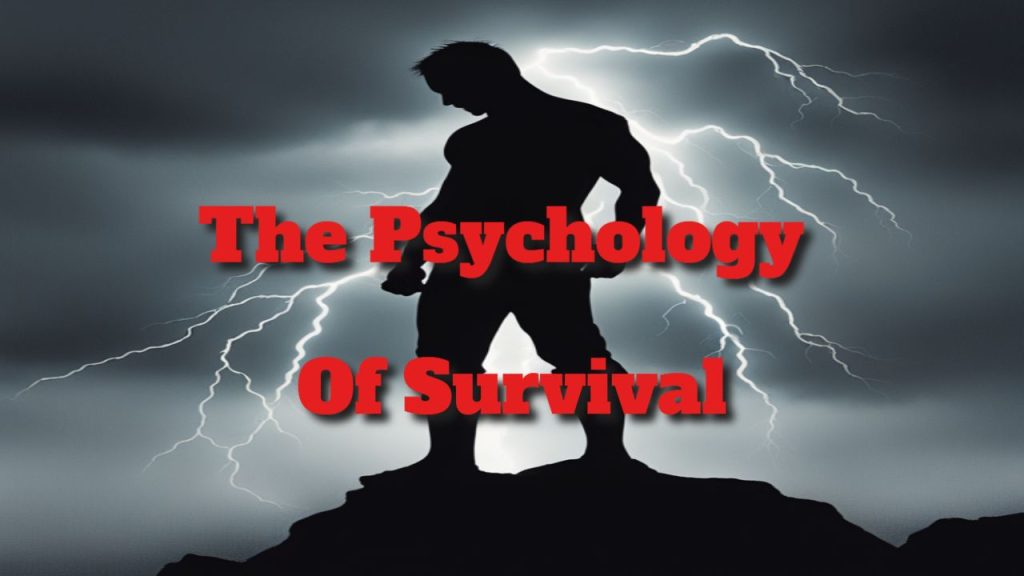Master Survival Psychology: Essential Strategies for Thriving in High-Pressure Situations
The saying “desperate times call for desperate measures” encapsulates the critical nature of survival, particularly when we delve into the intricate facets of survival psychology. During moments of extreme threat, the human mind embarks on a profound transformation, tapping into latent reservoirs of strength and resilience that typically lie dormant in our everyday lives. This transformation goes beyond simple reactions; it embodies a thorough mobilization of both mental and emotional faculties, illustrating the remarkable potential of our minds when faced with adversity. Grasping these psychological shifts is vital for anyone seeking to enhance their survival skills and mental resilience, as it lays the groundwork for understanding how to respond effectively when survival is at stake.
In scenarios marked by life-threatening danger, a complex interplay of psychological mechanisms activates. What exactly unfolds in our minds when each second is critical? How do we navigate pivotal decisions while grappling with overwhelming pressure? Furthermore, how does our innate psychological framework shape our ability to endure, adjust, and ultimately thrive in chaotic environments? These fundamental questions are crucial for comprehending the dynamics of survival psychology, which we will explore throughout this in-depth article. By highlighting the core elements that empower us to withstand duress, we can glean valuable insights into our inherent capabilities and behavioral responses during crises, ultimately enriching our understanding of survival.
Join us on an enlightening journey into the fascinating realm of survival psychology, where we will deconstruct its complexities and unveil the pivotal factors that influence our capacity to overcome adversity and succeed in life-threatening scenarios.
Understanding the Profound Influence of Fear on Survival Instincts and Reactions
Fear plays a fundamental role in our survival instincts, acting as a primal response that equips our bodies to react swiftly to potential threats. This powerful emotion ignites a cascade of physiological responses designed to enhance our chances of survival during perilous encounters. When fear grips us, significant physiological changes occur: our heart rate spikes, breathing becomes rapid, and muscles tense, creating an elevated state of alertness that prepares us for immediate action. Recognizing this physiological aspect is crucial for anyone aiming to refine their survival response and improve their ability to navigate dangerous situations.
This heightened readiness not only sharpens our reflexes but also promotes quick decision-making, empowering us to confront imminent dangers effectively. Additionally, fear heightens our sensory awareness, allowing us to perceive our surroundings with greater acuity and identify potential threats that might otherwise go unnoticed. It compels us to focus intently on our environment, enhancing vigilance and helping us to recognize warning signs that are critical for survival. In the absence of fear, our capacity to navigate hazardous situations could be severely compromised, underscoring its indispensable role in our survival toolkit. By understanding the intricate relationship between fear and survival mechanisms, we gain a deeper appreciation for the complexities of human behavior while equipping ourselves with practical knowledge that can be applied in real-world scenarios.
Building Resilience to Effectively Tackle Life’s Challenges
In the face of fear during high-stakes scenarios, the ability to cultivate resilience becomes essential for maintaining the fight for survival. Resilience is defined as the capacity to bounce back from adversity, adapt to challenges, and recover from setbacks, even when confronted with daunting obstacles. This vital quality often distinguishes those who succumb to despair from those who summon the inner strength to persist in their survival efforts. Actively cultivating resilience is a proactive approach that anyone can adopt to enhance their overall life experience and cope with stressors more effectively.
However, resilience does not imply the absence of fear or pain; rather, it embodies an unwavering determination to forge ahead despite emotional turmoil. It involves nurturing a positive mindset, establishing attainable goals, and adeptly utilizing available resources to navigate hardships. By fostering resilience, individuals empower themselves to confront life’s hurdles with confidence, equipped with the insight and strategies necessary to achieve success. This transformative mindset not only proves advantageous in survival contexts but also enriches one’s broader life experience, instilling hope and enabling individuals to tackle future challenges with renewed vigor and resolve.
Enhancing Decision-Making Skills Under Pressure for Optimal Results
The ability to make informed decisions can be significantly compromised in high-stress environments. The inherent pressure and urgency characteristic of these critical moments can blur our judgment, leading to hasty or poorly considered choices. During periods of stress, the brain triggers a heightened state of arousal, activating the fight-or-flight response, which can overwhelm rational thought processes and push individuals to rely more on instinct than on reasoned analysis. Acknowledging these patterns is essential for developing effective strategies to navigate high-pressure situations successfully.
This physiological reaction can hinder cognitive functions, making it increasingly difficult to process information and weigh the pros and cons of various options. To counteract these effects, it is vital to understand how stress influences decision-making and to actively implement strategies that mitigate its impact. Techniques such as deep breathing exercises, allowing brief moments of reflection, or consulting trusted individuals can significantly enhance one’s ability to make informed and effective decisions. By honing decision-making skills in high-pressure contexts, individuals can markedly improve their chances of successfully navigating through challenging and potentially life-threatening situations.
The Crucial Role of Social Support in Managing Crisis Situations
Recognizing the importance of social support is essential for effectively managing stressful circumstances. A strong network of friends, family, and colleagues provides invaluable assistance and resources, enabling individuals to cope and thrive during challenging times. The emotional backing, practical aid, and sense of community offered by social connections are vital for fostering resilience and enhancing overall well-being. In any crisis, the strength derived from social support can be transformative, making a significant difference in one’s ability to endure hardships.
Research consistently shows that individuals with robust social networks experience better mental health outcomes and recover more swiftly from traumatic events. Furthermore, having a support system enhances problem-solving abilities, introduces new perspectives, and provides necessary motivation and encouragement. Understanding the transformative power of social networks during crises can dramatically alter one’s experience, allowing individuals to draw strength and insights from others during times of need. Engaging with a supportive community not only aids in coping with immediate challenges but also contributes to long-term emotional resilience and recovery, reinforcing the idea that we are not alone in our struggles.
 Implementing Effective Coping Strategies for High-Stress Scenarios
Implementing Effective Coping Strategies for High-Stress Scenarios
What actionable strategies can be employed to navigate life-threatening situations successfully? Here are some effective tips:
– Maintain Calmness and Focus: Take a moment to engage in deep breathing and assess your surroundings before taking action. This approach can help clear your thoughts and sharpen your focus, allowing for more effective decision-making.
Prioritize Safety: Protect yourself and others by seeking shelter or moving away from imminent threats whenever feasible. Your safety should always be your top priority.
– Stay Aware: Remain vigilant about your surroundings, paying close attention to potential dangers or changes in the environment that could influence your safety.
– Communicate Clearly: If necessary, signal for help or inform others of the danger you are facing. Effective communication can be crucial in survival situations, ensuring that everyone is aware of the risks involved.
– Trust Your Instincts: Rely on your gut feelings and make prompt decisions based on the information available to you. Your instincts can provide invaluable guidance in high-pressure moments.
– Utilize Available Resources: Maximize the use of all accessible tools and resources to enhance your chances of survival, whether they are physical tools or social support.
– Maintain an Optimistic Mindset: Cultivate a belief in your ability to overcome the situation. A positive outlook can significantly impact your resilience and responses, encouraging you to persevere.
Effective Coping Strategies for Trauma Survivors and Individuals with PTSD
For individuals with a history of trauma or PTSD, implementing effective coping strategies during life-threatening situations is essential for managing anxiety and fostering resilience. Tailoring these strategies can empower individuals to regain control over their responses and navigate distressing situations with more confidence.
– Practice Deep Breathing Techniques: Engage grounding strategies to stabilize anxiety levels and foster a sense of calm. Deep breathing can help center your thoughts and mitigate feelings of panic.
– Seek Social Support: Reach out to friends, family, or mental health professionals for assistance. Connecting with others can provide critical support during challenging moments, reinforcing the idea that you are not alone in your struggles.
– Engage in Self-Care Practices: Prioritize activities that promote mental and physical well-being, aiding in recovery and building resilience over time.
These coping mechanisms are vital for managing anxiety and cultivating resilience. It’s important to recognize that resilience is not merely an inherent trait; it can be actively nurtured through consistent practice and support. With the right strategies in place, anyone—regardless of their background—can enhance their ability to recover from adverse situations.
Moreover, understanding how decision-making under stress affects long-term mental health and recovery from traumatic events is paramount. The manner in which decisions are made during high-pressure situations can significantly influence recovery trajectories and overall mental health in the aftermath of life-threatening experiences.
Identifying the psychological barriers that individuals face when seeking social support during crises is equally crucial. Common challenges during these pivotal moments may include feelings of vulnerability, fear of judgment, trust issues, and difficulties in articulating one’s needs. Recognizing these obstacles is essential, as they can hinder the process of seeking help and exacerbate stress and anxiety.
To effectively navigate these challenges and access the necessary support, consider taking manageable steps such as confiding in a trusted friend, consulting a mental health professional, or joining a support group. Remember that seeking help is a courageous action, and there are individuals who are ready and willing to assist you when you need it most.
Diving Deeper into the Fascinating Realm of Survival Psychology
The psychology of survival offers a rich and multifaceted area of exploration that provides profound insights into human behavior. While anxiety is a natural reaction to life-threatening events, resilience empowers us to recover from adversity and continue moving forward. By understanding how stress impacts decision-making, we can significantly enhance our survival chances. Additionally, acknowledging the crucial role of social support provides the essential strength and comfort needed during difficult times.
Utilizing effective coping strategies enables us to navigate complex and life-threatening situations more adeptly, ultimately leading to heightened resilience and improved mental health outcomes. This exploration of survival psychology not only enhances our understanding of our own capabilities but also equips us with practical tools necessary to confront unforeseen challenges with confidence and determination.
Your Questions About Survival Psychology Answered
How do anxiety disorders influence survival psychology?
What psychological distinctions exist in survival responses between individuals with anxiety disorders and those without?
Individuals with anxiety disorders may exhibit heightened reactions to fear and stress, whereas those without may engage in more adaptive coping strategies, resulting in varying survival outcomes.
What are the most effective coping mechanisms for trauma survivors or individuals with PTSD during survival scenarios?
The Article Survival Psychology: Understanding the Mindset Appeared First On Survival Avenue.
The post Survival Psychology: Mastering the Mindset appeared first on Survival Bite.
The Article Survival Psychology: Unlocking Your Mental Resilience Was Found On https://limitsofstrategy.com






Comments are closed